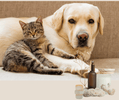
Fragrances and Our Best Friends: Are Essential Oils Bad for Dogs and Cats?
, by Corinna Stanley, 6 min reading time

, by Corinna Stanley, 6 min reading time
Essential oils offer a range of therapeutic benefits for humans. However, their concentrated nature can pose significant risks to pets, especially cats and dogs. It's crucial to understand which oils are safe and which should be avoided entirely.
Our canine and feline companions have an incredible sense of smell, far surpassing our own. While this olfactory prowess is impressive, it also makes them highly sensitive to scents, including those from fragrances and essential oils. Let's break down the potential risks for both dogs and cats, including the various routes of exposure, the difference between fragrance and essential oils, and safe practices for using scented products.
Before diving into the risks, it's essential to understand the difference between fragrance and essential oils:
Fragrance oils
These are synthetically created scents, often composed of a complex blend of chemicals. They can be derived from natural or synthetic sources.
Essential oils
These are concentrated extracts from plants, containing the plant's essence and aroma compounds. They are considered natural products.
Both fragrance and essential oils can pose risks to pets, but essential oils are generally considered more potent and potentially toxic due to their concentrated nature.
Pets can be exposed to harmful fragrances and essential oils through three primary routes:
Common symptoms of essential oil toxicity in dogs and cats include
If you see any of these signs in your pet seek urgent veterinary advice.
While dogs are generally less sensitive to essential oils than cats, many can still be harmful. However, not all scents are harmful.
Cats are even more sensitive to fragrances than dogs. Their bodies process scents differently, making them more vulnerable to the toxic effects of essential oils.
By understanding the potential risks of essential oils and taking precautions, you can create a safe and enjoyable environment for both you and your four- legged family members.